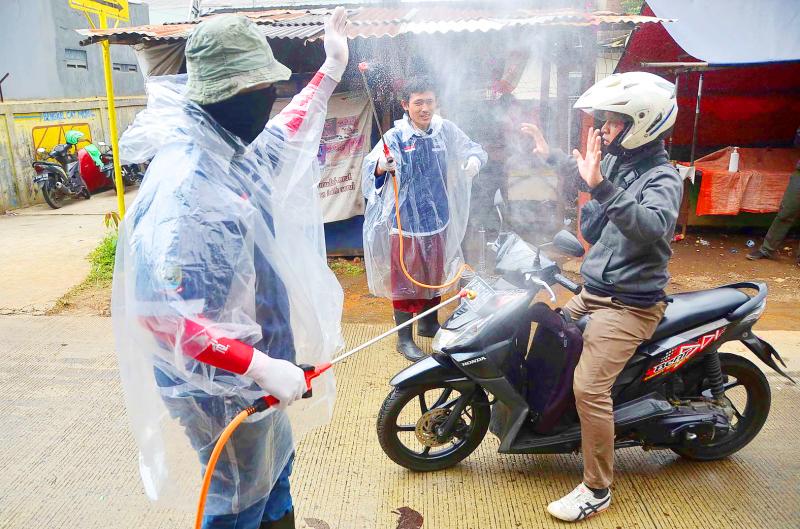Indonesian President Joko Widodo yesterday said he planned stricter rules on mobility and social distancing as a study presented to the government warned of a risk of more than 140,000 COVID-19 deaths by May without tougher action.
Medical experts have said the world’s fourth-most populous country must impose tighter movement restrictions as known cases of the highly infectious respiratory illness have gone from zero early this month to 1,414, with 122 deaths.
Indonesia accounts for nearly half of the 250 deaths reported across Southeast Asia, but fewer than one-fifth of about 8,400 cases that have been confirmed in the region. Nearly one-third of those cases are in Malaysia.

Photo: AFP
Most infections in Indonesia have been concentrated in and around the capital, Jakarta. The city of 10 million people has declared a state of emergency which shut down schools and public entertainment, but so far the president has been reluctant to impose a full public lockdown.
“I’m [now] ordering large-scale social limits, physical distancing needs to be done more sternly, more disciplined and effectively,” Widodo told a Cabinet meeting, adding that only the central government could decide on regional quarantines.
Widodo has encouraged social distancing, but questioned whether Indonesians have the discipline for full lockdowns, in contrast with Southeast Asian nations, such as the Philippines, Malaysia and Thailand.
However, he appears to have reconsidered this approach after public health experts on Friday presented a prediction model to Indonesia’s planning agency Bappenas underlining a need for stronger intervention to prevent a rapid rise in cases and deaths.
The model, a copy of which was reviewed by Reuters, said Indonesia could instigate three stages of intervention: mild, moderate and high. The latter would include very significant levels of testing and making physical distancing mandatory.
With mild intervention, which includes optional physical distancing and limiting public crowds, researchers from the University of Indonesia said the virus death toll could soar to more than 140,000 among over 1.5 million cases by May.
“These are just conservative estimates,” said Pandu Riono, one of the researchers. “But we have to be ready even in these circumstances.”
Riono characterized measures currently taken by Indonesia, from rapid testing and deploying regional labs to test samples, as only approaching mild intervention.
Health experts have said onesia faces a surge in coronavirus cases after a slow government response believed to have masked the scale of the outbreak in a country with still very low levels of testing and with a significant deficit in hospital beds, medical staff and intensive-care facilities.
Bappenas officials said the model served as input for the government and to help them allocate budgets.
Indonesian Minister of Finance Sri Mulyani Indrawati last week said that 62.3 trillion rupiah (US$3.82 billion) of spending in this year’s budget could be redirected to tackling the coronavirus.

SECURITY: As China is ‘reshaping’ Hong Kong’s population, Taiwan must raise the eligibility threshold for applications from Hong Kongers, Chiu Chui-cheng said When Hong Kong and Macau citizens apply for residency in Taiwan, it would be under a new category that includes a “national security observation period,” Mainland Affairs Council (MAC) Minister Chiu Chui-cheng (邱垂正) said yesterday. President William Lai (賴清德) on March 13 announced 17 strategies to counter China’s aggression toward Taiwan, including incorporating national security considerations into the review process for residency applications from Hong Kong and Macau citizens. The situation in Hong Kong is constantly changing, Chiu said to media yesterday on the sidelines of the Taipei Technology Run hosted by the Taipei Neihu Technology Park Development Association. With

CARROT AND STICK: While unrelenting in its military threats, China attracted nearly 40,000 Taiwanese to over 400 business events last year Nearly 40,000 Taiwanese last year joined industry events in China, such as conferences and trade fairs, supported by the Chinese government, a study showed yesterday, as Beijing ramps up a charm offensive toward Taipei alongside military pressure. China has long taken a carrot-and-stick approach to Taiwan, threatening it with the prospect of military action while reaching out to those it believes are amenable to Beijing’s point of view. Taiwanese security officials are wary of what they see as Beijing’s influence campaigns to sway public opinion after Taipei and Beijing gradually resumed travel links halted by the COVID-19 pandemic, but the scale of

A US Marine Corps regiment equipped with Naval Strike Missiles (NSM) is set to participate in the upcoming Balikatan 25 exercise in the Luzon Strait, marking the system’s first-ever deployment in the Philippines. US and Philippine officials have separately confirmed that the Navy Marine Expeditionary Ship Interdiction System (NMESIS) — the mobile launch platform for the Naval Strike Missile — would take part in the joint exercise. The missiles are being deployed to “a strategic first island chain chokepoint” in the waters between Taiwan proper and the Philippines, US-based Naval News reported. “The Luzon Strait and Bashi Channel represent a critical access

Pope Francis is be laid to rest on Saturday after lying in state for three days in St Peter’s Basilica, where the faithful are expected to flock to pay their respects to history’s first Latin American pontiff. The cardinals met yesterday in the Vatican’s synod hall to chart the next steps before a conclave begins to choose Francis’ successor, as condolences poured in from around the world. According to current norms, the conclave must begin between May 5 and 10. The cardinals set the funeral for Saturday at 10am in St Peter’s Square, to be celebrated by the dean of the College